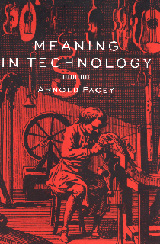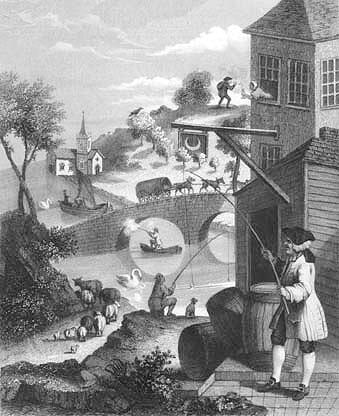



|
|||
| Technology, Meaning in | 
|

|
Comparisons & contrasts
are a means that often reveal a deeper meaning:
The relation of heuristics to praxis |
|||
|---|---|---|---|
| relate | discovery | to practice | |
| findings | techniques | ||
A craft is a form of technique that may enable or stifle discovery.
Remember that: the contexts of technological change are:
society, nature, people, mechanization & conflict.


"

loss of meaning | contents of Meaning in Technology | Technology transfer | dimensions of tools | history
Heuristics means the capacity for anyone to discover for themselves how something works, how to efficiently use devices, or how to effectively achieve a desired end.
How does the "Eureka effect" contribute to our understanding of invention, the driver of technological complexity?
• society, • nature, • people, • mechanization & • conflict.
The eureka effect represented by Archimedes famous story of discovery involving a gold plated crown is not a necessity for invention. But it does mark one feature of our imagination needed for inventions to create breakthroughs between two otherwise unconnected tool complexes. For either convergence among separate technologies to occur or standardization within competing but similar tool complexes to occur the capacity to visualize the solutions to problems in existing tools is a necessary facet of successful invention. John B. Jervis, a locomotive designer in upstate New York, in the 1830s recognized the necessity of changing the wheel mountings on steam engines to adapt the machine to the sharper curves and steeper grades of US railways.
Railroads developed out of the need to transport coal and iron from mines to foundries (iron-making plants) but a change from cast iron to wrought iron rails in the 1820s made carriages and locomotives suitable and safe to carry passengers and not only freight. In 1825 the Stockton and Darlington Railway became the first commercial passenger rail service. By 1850 America, Europe and India were the sight of extensive railroad building enterprises that created a new and pervasive industrial revolution that reorganized labor, finance, and geographical space. Such change occurred due in part to convergence and standardization.
Praxis means the actual repeated performance needed for using techniques effectively with any appropriate tools.
• society, • nature, • people, • mechanization & • conflict.
Is the development of craft-culture responsible for complex changes in designs?
Jonas Norberg in adapting Chinese winnowing and threshing machines, or Thomas Telford in copying Chinese chain bridges are examples of such a craft culture in the late 18th century and examples of cross cultural transfer of technology, techniques and ideas.
Abraham Darby, who was an iron smelter in Coalbrookedale, England, developed a coke blast furnace in 1709 for the smelting of iron. He did this because supplies of charcoal from the surrounding deforested woodlands set limitations on the amount of pig iron that could be made. The use of cast iron in the building of this bridge above was just one of many adaptations of smelting iron that Dar by initiated in England. The use of iron for cylinders was an essential ingredient in making efficient steam engines in the 1720s and 1730s, and without the coke process the quality and strength of the iron would have been inadequate for the industrial sized steam engines then being used to drain mines.
Pacey, Tech. in World Civilization, p. 113, p. 134.
See also clocks.
Technics, technique -- the way of carrying out a task, especially the artful and effective use of tools to achieve a desired end.
Readings by short titles of chapters & selections from authors
Neil Postman, Technopoly
Carroll Pursell, White Heat
Edward Tenner, Why Things Bite Back, 1997.
Mark E. Eberhart, Why Things Break.
Arnold Pacey, Technology in World Civilization, [TWC]
Charles P. Snow, Two Cultures
Michio Kaku, Visions
Environment, Gender and gender conflicts with respect to automated tool complexes.
Pacey on Meaning | Pursell | Technology defined | Dimensions of Technology
loss of meaning | contents of Meaning in Technology | Technology transfer | dimensions of tools | civilization
 |
||
|---|---|---|
| Tools of Toil: what to read. | ||
| Tools are historical building blocks of technology. | ||
What is the history of technology?
First page of web site | Site map | Vocabulary